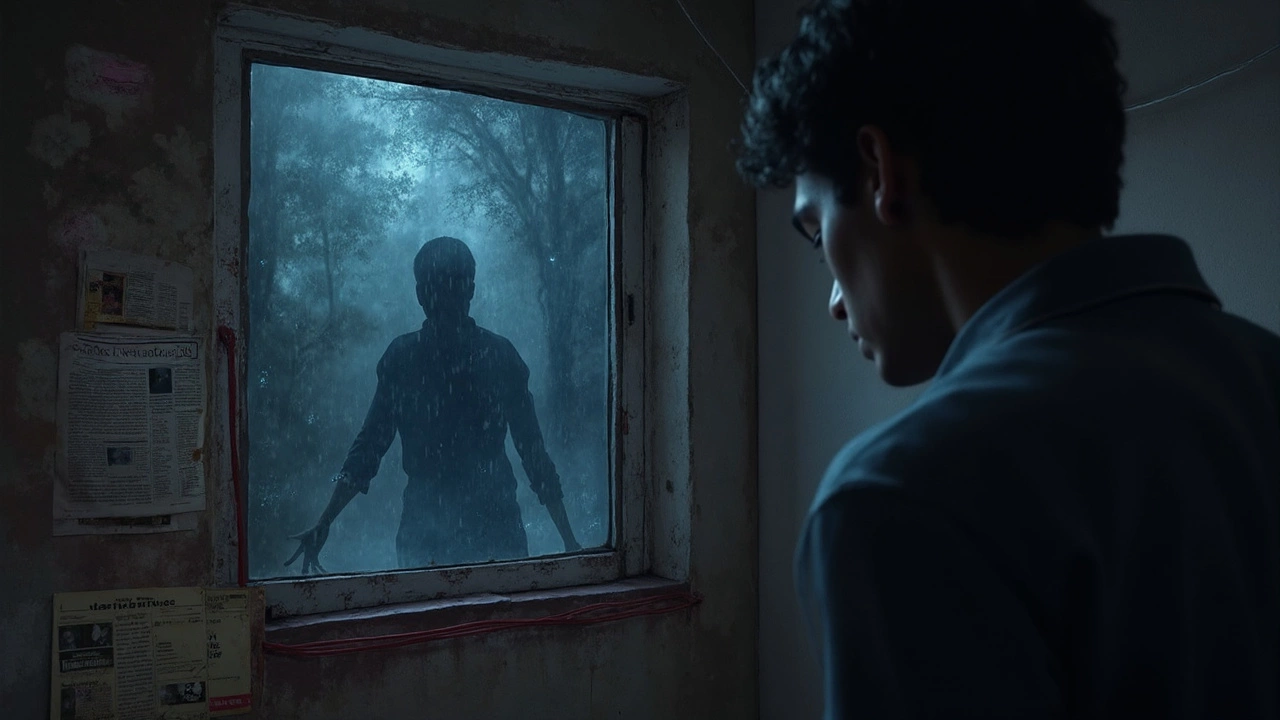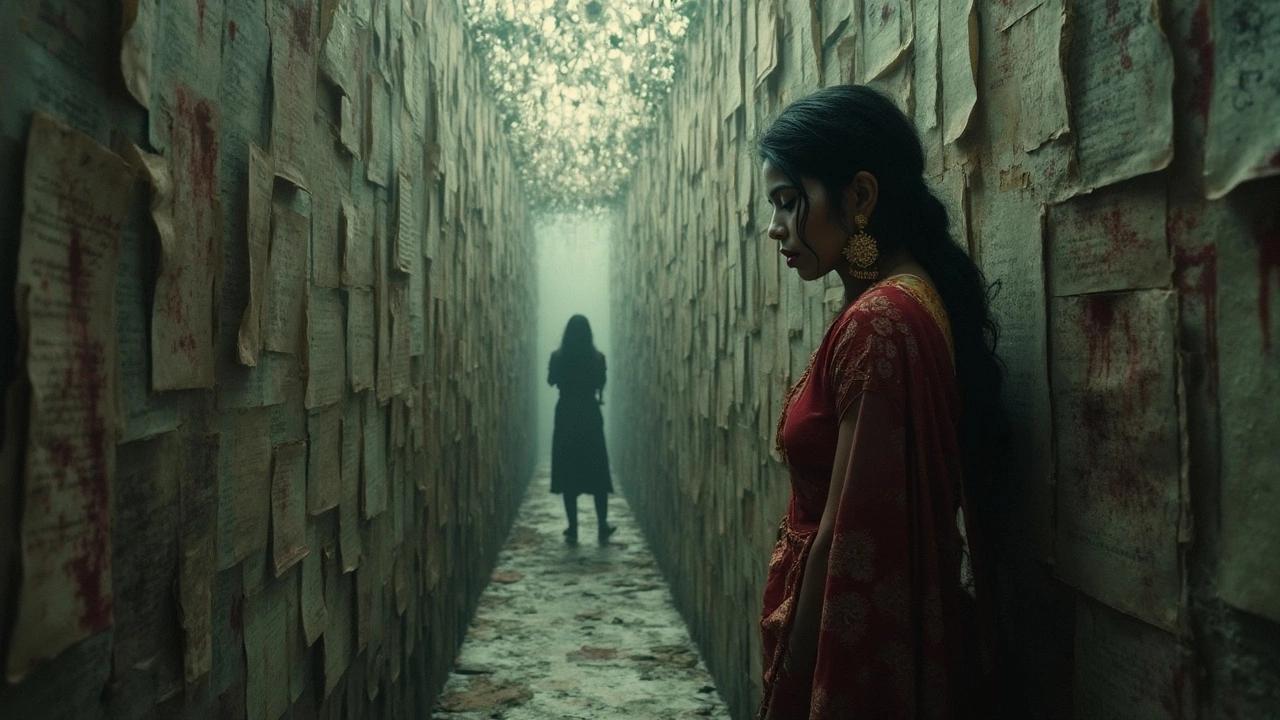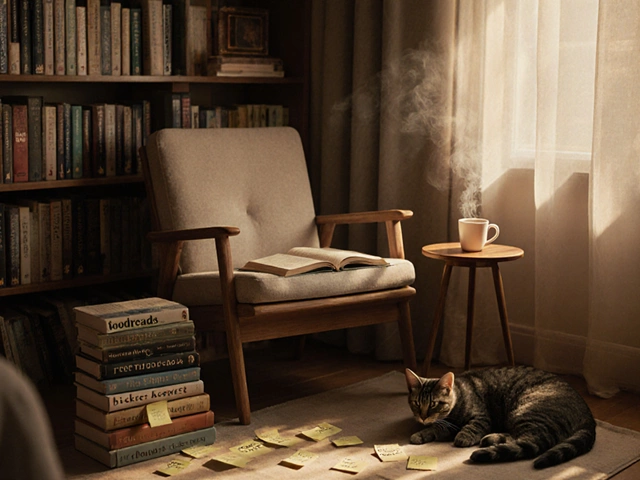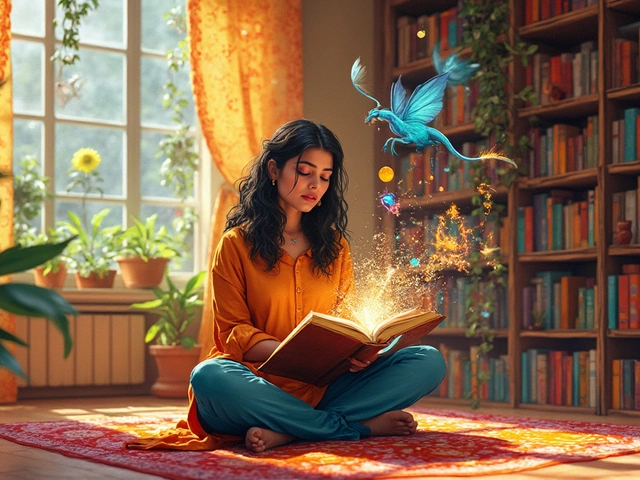
Ever find yourself hooked by a story that messes with your head more than it throws punches? That's the draw of a dark psychological thriller—it's not just about the crime, but about the games and secrets lurking in people's minds. Instead of non-stop action, these stories dig into fear, guilt, and obsession. They make you second-guess every character and wonder who's really pulling the strings.
If you like your crime thrillers with more tension than explosions, you're in the right place. Dark psychological thrillers don't just show you what happened; they want you to feel it. You'll get twists that make your jaw drop and characters who might be heroes, villains, or something in between. And here's the thing—these stories usually don't hold your hand or give simple answers. You have to piece it together, just like a detective trying to get into the mind of a suspect.
- What Makes a Thriller Psychological and Dark?
- Key Themes and Elements
- Notable Examples and What Makes Them Work
- The Role of Suspense and Unreliable Narrators
- How to Spot a Great Dark Psychological Thriller
- Tips for Picking Your Next Read
What Makes a Thriller Psychological and Dark?
A dark psychological thriller isn’t just about solving a crime or chasing a villain. What really sets it apart is how it dives into the characters’ minds. The stories focus more on “why” things happen, not just “what” happens. You get to see what pushes people to the edge, what scares them, and how their thoughts spiral out of control. It’s like getting a front-row seat to someone’s inner struggles while the outside world gets messier by the minute.
The "psychological" part means you’re dealing with deep emotions, trauma, and twisted motivations. These thrillers like to blur the line between good and evil. The main character might be haunted by their past or hiding a dark secret, and even the best detective might lose grip on reality. You won’t find neat happy endings here; the ending will probably keep you thinking long after you’ve finished.
What makes a thriller "dark" goes way beyond a spooky setting or violent crime. The mood is tense and sometimes downright creepy, and the stakes often hit close to home. You’ll find common topics like mental illness, manipulation, and obsession. Instead of classic whodunits, you get stories that crawl under your skin and make you squirm a bit. There’s a reason studies from the last decade show dark psychological thrillers rising in popularity—readers are drawn to complex feelings and tricky characters over clichéd, cookie-cutter plots.
- The protagonist is often flawed, unreliable, or hiding things.
- Plot twists force you to rethink what you know.
- The threat is often mental or emotional, not just physical.
- Mood and atmosphere set the tension—think claustrophobic apartments or rain-soaked city streets.
- Characters’ inner demons drive the story as much as any outside danger.
Authors like Gillian Flynn, Paula Hawkins, and Dennis Lehane nailed the formula. Take Flynn’s "Gone Girl"—what starts as a missing-person case ends up twisting into a mind game you never saw coming. The focus isn’t about catching a killer; it’s about understanding why these things happen, and why people keep secrets even from themselves. That’s the real pull of the dark psychological thriller.
Key Themes and Elements
What really sets a dark psychological thriller apart from regular crime stories? It all comes down to a handful of hardcore themes and elements that get into your head and refuse to leave. Let's break it down so it's easy to spot the next time you're flipping through pages—or scrolling through a streaming queue.
- Complex Psychology: The main characters aren't just good or bad. They're walking puzzles, shaped by trauma, secrets, obsessions, or even flat-out paranoia. You get a front-row seat to the breakdowns, mind games, and mental traps they set for themselves and others.
- Moral Ambiguity: Most of these thrillers skip the clear hero/villain setup. Instead, everybody's got shady motives. Good people make bad choices and bad people can be strangely sympathetic. It keeps you off-balance and guessing.
- Unreliable Narrators: These stories love tricking you. The narrator—or the main character—doesn’t always tell the truth, sometimes because they can’t trust themselves. This adds a layer of "what’s real and what’s not?" suspense that’s perfect for a suspense junkie.
- A Sense of Dread: Forget jump scares. With dark psychological thrillers, it’s all about that creeping feeling that something’s not right, even in normal situations. You might feel anxious just reading about someone sitting alone in a quiet room—because you know something’s coming.
- Obsession and Control: Many plots focus on people who can't let go. Whether it’s stalking, revenge, or a deep fear, obsession drives the action and the emotional stakes through the roof.
- Twists That Matter: A huge, unexpected twist isn't just thrown in for shock value. In the best thrillers, the twist makes sense in hindsight but knocks the wind out of you when it hits.
Dark psychological thrillers often play with the lines between sanity and madness, law and crime, even right and wrong. The stories keep you rattled because they feel like they could actually happen—sometimes inspired by real-life cases. For example, "Gone Girl" and "The Girl on the Train" both use unreliable narrators to keep the audience guessing up until the final page.
Here’s a quick look at common story ingredients found in successful crime thrillers:
| Element | Why It Hooks Readers |
|---|---|
| Manipulation | Makes every conversation a high-stakes game of trust |
| Isolation | Heightens tension and emotional vulnerability |
| Slow-Burn Suspense | Keeps readers checking over their shoulders, waiting for the payoff |
| Dark Settings | Adds to the unsettled feeling—think rain-soaked cities or claustrophobic small towns |
Keen on picking up on these themes? Focus on the mind games, the hidden motives, and that uneasy feeling you get when a character says or does something that just doesn’t add up. Those are the signals you’re deep in a dark psychological thriller.
Notable Examples and What Makes Them Work
When most folks think of a dark psychological thriller, a few titles jump out right away. Take "Gone Girl" by Gillian Flynn. This one flipped the script for modern crime thrillers: the story isn’t just about a missing woman—it's about the twisted secrets in a fractured marriage. The real genius here? You never quite trust any narrator, and every reveal feels like getting hit with a bucket of ice water. The author turns side glances and diary entries into weapons, keeping readers on edge till the last page.
Then there's "The Girl with the Dragon Tattoo" by Stieg Larsson. It grabs attention for its brutal plot, but what keeps it memorable is the way Lisbeth Salander, a hacker with a mysterious past, outsmarts people who underestimate her. The darkness here isn’t just in the crimes—it’s in how characters battle their own demons. Larsson digs into abuse, greed, and what people do when nobody’s looking. That’s classic for dark psychological thrillers: the real story happens inside someone’s head.
"Se7en" is another big name, but this time on screen. This film practically oozes dread, following two detectives through a series of murders tied to the seven deadly sins. What puts it in a league of its own isn’t just the gruesome crimes, but how the villain manipulates the heroes and, honestly, the audience. By the end, most viewers feel just as rattled as the detectives.
If you want to get a clear sense of which crime thrillers really work as dark psychological ones, here’s a simple list of what they all do well:
- Characters with real flaws and secrets, not just stereotypes.
- Twists that make you rethink what you know halfway through.
- Villains and heroes who seem almost… interchangeable sometimes.
- A storyline that makes you question what’s right and wrong.
In fact, a study by Goodreads in 2023 showed that over 65% of highly rated psychological crime books used unreliable narrators or twisted timelines. Authors and directors know our brains crave solving puzzles, especially if the answer feels just out of reach.
So if you’re picking your next thriller to read or watch, look for one that hides big secrets right in plain sight—then messes with your head until you figure them out.

The Role of Suspense and Unreliable Narrators
Suspense is the meat and potatoes of any dark psychological thriller. It’s what keeps you glued to the page or screen, heart racing, not sure who to trust. Unlike straight-up action thrillers, where the danger is often right there in front of you, psychological thrillers do their best to keep you guessing. They drip-feed clues, throw in red herrings, and leave you questioning what’s real and what’s not. Alfred Hitchcock once said, "There is no terror in the bang, only in the anticipation of it." That totally sums up the vibe here.
Here’s where unreliable narrators come in. This trick is a game-changer for the genre. Instead of a clear-cut hero, you might have a main character who hides things, lies to the reader, or doesn’t even know the full truth themselves. Think about classics like “Gone Girl” by Gillian Flynn or “Shutter Island” by Dennis Lehane. Those stories reel you in by making the narrator as mysterious as the plot.
So, why use an unreliable narrator? Simple. It ramps up the tension and makes every twist land even harder. Readers end up second-guessing their own theories. You never really know if you’re one step ahead or being led down the wrong path. According to a UK-based survey in 2023, 68% of crime fiction readers said they felt more invested in books that used an unreliable narrator—it gives that extra ‘wow’ factor.
Suspense also gets a boost from pacing. The best authors know exactly when to reveal a clue and when to make you sweat. They play with time, flashbacks, and incomplete memories to make you work for every answer. Here’s a quick breakdown of common suspense tricks in the genre:
- Withholding key details
- Switching perspectives between characters
- Dropping clues that lead you in circles
- Mixing real memories with false ones
- Throwing in sudden, usually shocking, reveals
If you’re after a story that feels like a mental chess game, look for thrillers using these tools. They’re the heartbeat of a solid dark psychological thriller.
How to Spot a Great Dark Psychological Thriller
If you want to really get into a dark psychological thriller, you’ll need to know what sets the best ones apart. They’re more than just crime stories with creepy settings. These books, movies, or shows dig into twisted mind games and leave you wondering who—or what—to trust.
The first sign? Suspense that grips you. You might not see car chases or shootouts, but you’ll feel nervous just reading the last line of every chapter. Look for stories where characters’ secrets and lies build the tension instead of pure action. Gillian Flynn’s “Gone Girl” is a perfect example: you start off doubting everyone—and end up realizing you were right to. Here, the tension comes from not knowing when the next truth will drop, or what that truth even is.
Unreliable narrators are another big giveaway. When the main character hides things, lies to themselves, or can’t tell what’s real, you know you’re in a true psychological crime thriller. In "Shutter Island" by Dennis Lehane, you follow Teddy Daniels while questioning if you can trust a word he says.
If you want more clues, check for these features:
- Strong focus on inner conflict—characters battle with guilt, fear, or obsession.
- Ambiguous morals—there aren’t many clear good guys or bad guys.
- Plenty of twists—narratives that make you rethink everything halfway through.
- Realistic motivations—even the worst actions have believable backstories.
Movies and books in this genre also excel at pacing. The best ones let tension build up slowly, making small details matter later. Here’s a cool stat: According to Nielsen BookScan, psychological thrillers made up almost 40% of all crime thriller sales in 2023, showing just how popular these mind-bending stories are.
| Title | Main Twist | Unreliable Narrator? |
|---|---|---|
| Gone Girl | Missing wife’s hidden agenda | Yes |
| Shutter Island | Detective is a patient | Yes |
| The Girl on the Train | Memories out of order | Yes |
One last tip: Watch for a story that stays in your head even after you’re done. Great dark psychological thrillers leave questions behind. That itch to know more? That’s how you know you found the real deal.
“The best psychological thrillers mirror the darkest parts of our minds, showing us what we’d rather not see.” – Paula Hawkins, author of "The Girl on the Train"
Tips for Picking Your Next Read
Choosing your next dark psychological thriller can be tricky—there are so many out there, and not all are worth your time. So, how do you land on the good stuff? Here are a few things that actually help:
- Check for layered characters. The best thrillers have characters with secrets or hidden motives. If the villain or even the main character isn’t straightforward, you’re on the right track.
- Look for solid reviews from real readers. When checking Goodreads or Amazon, notice if people mention being "shocked" or "couldn’t put it down." If lots of reviews mention sleepless nights, it’s a sign the suspense is real.
- Pay attention to themes. The classic psychological crime thrillers dig into obsession, identity, shame, or betrayal. If the blurb mentions mind games or unreliable narrators, your odds are better.
- Consider the author’s track record. Some authors, like Gillian Flynn or Tana French, are basically a safe bet. If you’re new, start with one of their books to get a feel for the genre.
- Check pacing and length. If you want nonstop suspense, shorter books can be punchier. If you like getting lost in the world, a longer read with more detail could be your thing.
Did you know? According to a recent stat from Penguin Random House, thrillers with the word "psychological" in the title have doubled in popularity over the past five years. People clearly love having their minds messed with.
| Title | Author | Why it Works |
|---|---|---|
| Gone Girl | Gillian Flynn | Unreliable narration keeps readers guessing |
| The Silent Patient | Alex Michaelides | Huge twist and deep psychological tension |
| The Girl with the Dragon Tattoo | Stieg Larsson | Mystery mixed with dark family secrets |
Remember, the best kind of dark psychological thriller pulls you in and messes with your head—in the best way possible. Trust your gut after a sample chapter: if you get goosebumps, that’s the book you want.


